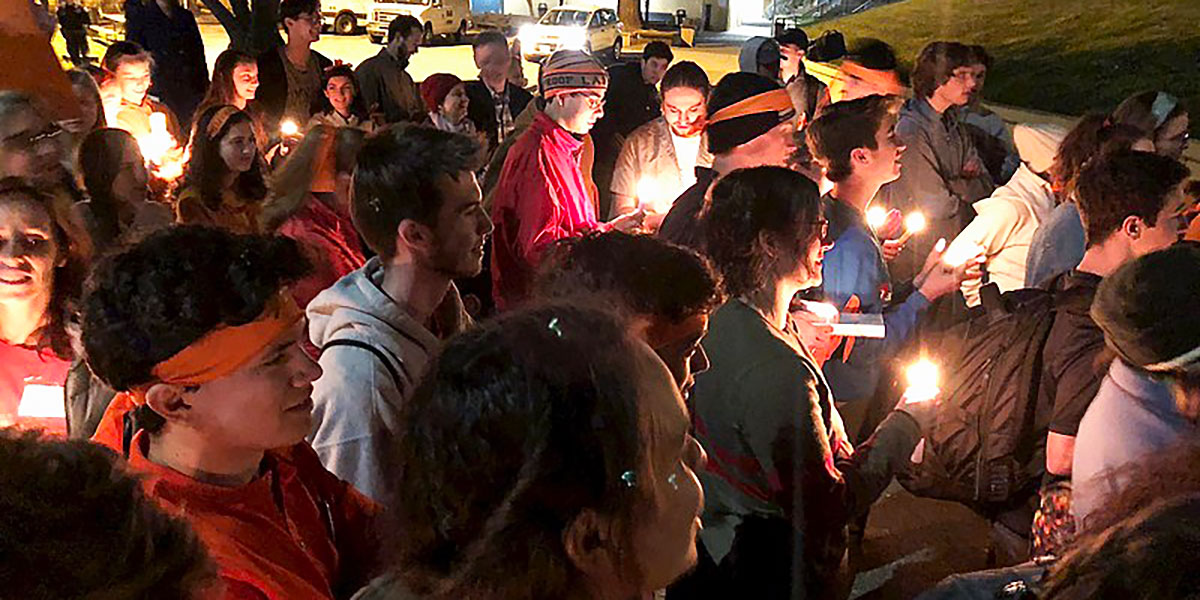America’s perpetual war with terrorists abroad is raging on as foreign extremists plot against the U.S. with malicious intent. We are told to fear an attack from the Third World, but should this be our main concern?
 Copyright-free photo from Google Images
Copyright-free photo from Google Images
Students from Tamalpais High School in Mill Valley, California, hold a candlelight vigil on Feb. 15, 2018, in the wake of the Parkland High School shooting, which claimed the lives of 14 students and three staff members at the Florida school.
__________________________________________________
NATO defines terrorism as: “The unlawful use or threatened use of force or violence against individuals or property in an attempt to coerce or intimidate governments or societies to achieve political, religious or ideological objectives.” There is no doubt we should all be aware and impose as many protective measures as possible to make sure the American population is safe from foreign attacks. However, what if I told you the real terrorists we should fear are American citizens? That we should fear our next door neighbor more than any threat outside of our borders? Americans are a much bigger threat to America’s internal security than jihadis abroad. Joe, the buddy you go golfing with, or Dave, the cashier at Walmart, are the ones who should alarm us more than a radical Islamic idealist from thousands of miles away. There were approximately 3,000 people killed in the 9/11 attacks, which can be counted as an anomaly, but the threats that must truly be feared occur on regular days by regular U.S. citizens. When we take into account incidents such as Stephen Paddock, Dylann Roof and Adam Lanza, we notice something. Most mass shootings and terror attacks such as these are from white American males. Paddock opened fire on a crowd at an outdoor concert in Las Vegas Oct. 1, 2017, killing 58 people. Roof walked into an African-American church in Charleston, South Carolina, June 17, 2015, and opened fire, killing nine people because they were black. Recently, on Oct. 27, 2018, white supremacist Robert Bowers, walked into the Tree Of Life Synagogue in Pittsburgh and killed 11 people while they were worshipping, according to police officials. The numbers suggest that we should fear a white American male more than any Islamic radical. In fact, since 2001 (the year of the 9/11 attacks on New York’s Twin Towers), 85 mass killings have taken place in America, with 62 of them being carried out by far-right extremists, according to a recent Government Accountability Office report. However, while the cases of these criminals move through the court system and ultimately render justice, it appears that none of these men will be charged with domestic terrorism because there is no federal law that specifies domestic terrorism as a crime. The U.S. only charges domestic terrorism against residents of the U.S. who have a connection to foreign terrorist factions. The list of mass shootings and terror carried out in the U.S. is lengthy, yet we are conditioned to be afraid of an imminent attack from abroad. President Trump’s travel ban focuses on Muslim-majority nations like Iran, Syria, Libya, Somalia and Yemen, however, when we look at the data this ban makes no sense. Terrorists from these countries have killed a total of zero U.S. citizens between 1975 and 2015, so exactly what terror does this ban stop? Instead of a flawed travel ban, perhaps the government should focus on the much bigger problem of violence in America, performed by Americans. America needs to realize the true threat to internal American security is other Americans, and while the truth may not be pretty, it is a giant leap toward imperative reforms.